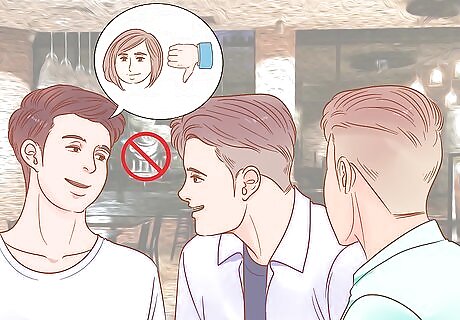
views
Listen without distractions.

Give 100% of your attention to your partner. Put your phone away, make eye contact, and stop looking around the room to see what else is going on; give your partner your full attention when they talk to you. Repeat what your partner said in your own words to show that you understand what they’re saying. For example, if your partner is talking about their day at work, you might say, “I see that you’re frustrated because your boss doesn’t appreciate you.” Your partner might need extra support if they’re struggling. If your partner is going through a rough patch, be sure to offer your unlimited support to help them feel better.
Acknowledge your partner’s contributions.

Let them know you appreciate all they do for you. If your partner is a great cook, thank them for making a delicious dinner. If they’re always kind and attentive, let them know how much it means to you. A little bit of acknowledgement can go a long way, and it will help build your relationship stronger. This can mean that saying “thank you” and being specific, writing them a love note, or just taking the time to acknowledge positive behavior. If you never acknowledge all of the nice things your partner does for you, they might think you’re taking advantage of them.
Talk about issues as soon as they happen.

Don’t wait until your feelings reach a boiling point. If something is really bothering you, then sit down and have a serious conversation about it. Your partner can’t guess what’s going on in your head, so it’s important to talk it out before you’re seething mad. If you don’t talk about the things that are bothering you, then you’re likely to be passive aggressive toward your partner, which is also not very respectful.
Compromise with each other.

Relationships involve a little bit of give and take. If you’re in disagreement about something, don’t focus on being “right” or “winning” the argument. Instead, listen to each other and discuss the pros and cons of the situation. Then, you can come up with a solution that makes you both feel comfortable. For instance, if you need more alone time than your partner does, you can compromise by setting aside a few days of the week to spend together and a few days of the week to spend apart. When it comes to making smaller decisions, such as where to eat, you may be better off just taking turns.
Tell your partner what you need.

Don’t make them guess. Communicate clearly when there’s an issue happening. The more you can talk it out together, the better your relationship will be overall. Talking about what you need can leave you feeling vulnerable, but it’s better than harboring resentment or anger. For example, maybe you want your partner to start handling more chores around the house. Sit down with them and say, “I feel like I’ve been handling the majority of the housework, and I don’t think that it’s fair. I need us to start splitting the chores evenly so I can stop feeling resentful.”
Apologize when you’ve made a mistake.

You’re going to mess up, and that’s okay. When you realize you’ve made a mistake, say you’re sorry to your partner and acknowledge that you’ve hurt them. Don’t make excuses, and try to make it clear that you regret what happened. A good apology looks like: “I’m really sorry that I didn’t call you when I knew I was going to be late. It was an error in judgement, and I know it made you worried.” Of course, actions speak louder than words. You should not only say you’re sorry, but make a real effort not to do whatever you did again.
Support your partner’s passions.

What does your partner like to do for fun? Do they have any hobbies? If there’s something they really like to do (play board games, go rollerblading, read fantasy novels) then you should try to support them in it. Encourage them to do what makes them happy, and don’t talk negatively about their activities of choice. Even if you don’t quite understand it or you don’t think it’s fun, you should still try to be supportive.
Respect your partner’s boundaries.

Everyone has personal boundaries that are important to them. Maybe your partner is really private and hates it when you look through old photos of them; maybe they don’t like it when you tease them about how they were overweight as a child. Whatever those boundaries are, you have to recognize them and be caring and respectful enough to respect them. Respecting your partner’s privacy is crucial to a successful relationship. Don’t think that you have the right to snoop through your partner’s phone or computer just because you’re dating. This goes for sexual boundaries, too. When your partner says “no,” back off from doing anything physical right away.
Disagree without yelling or name-calling.

It’s normal to fight in a relationship, but you can do it calmly. If you have a disagreement with your partner, bring it up respectfully and keep your tone neutral. Avoid yelling or name-calling, and focus on having a productive discussion where you both feel satisfied at the end. Instead of being condescending or mean when you don’t agree, focus on phrasing it with "I" language, such as “I understand why you would see it that way…” or, “I just don’t think that’s the most suitable option right now…” Remember that how you say things can be just as important as what you say. Remember that if you start by being aggressive and angry, your partner will be much less likely to share their ideas or to compromise.
Be honest with your partner.

Maintaining trust is a big part of respecting your partner. Though you may not feel comfortable revealing everything about yourself and there are some things about your life you’d like to keep private, you should avoid lying to your partner’s face as much as you can. If they find out that you’ve broken their trust, it will be pretty difficult to repair. This includes things like where you went last night, who you were with, and who you’re texting. Even if you think your partner might not like it, it will be a lot worse if they find out you lied. Of course, there are times when a little white lie can’t hurt. Maybe your partner bought a new shirt and you just can’t stand it, but you say you like it anyway.
Give your partner space.

You can both have your own friends and interests. While it’s fine to spend a lot of time together, you should both have things to do that don’t involve each other. Try not to smother your partner, and let them go enjoy the things they like to do, even if it’s without you. For instance, maybe you like to skate but it’s not really your partner’s thing. You can head out to the skatepark with your friends while your partner does something else.
Don’t speak badly about your partner.

Venting to those closest to you is okay, but don't go too far. If you often vent to your family and friends, try to keep it respectful when you’re talking about your partner. Even if you just got in a fight or you’re going through a rough patch, constantly talking negatively about the person you love can make your relationship look bad to others. Your friends and family members don’t love your partner the way that you do, so they can harbor negative feelings toward them more than you can. Be sure to tell your friends about the good stuff your partner does, too. If your partner told you anything in confidence, don’t talk about it with your friends and family.
Don’t check out other people in front of them.

It can make your partner feel like they aren't attractive enough. While it’s fine to think other people are attractive, you shouldn’t openly ogle or stare at others, especially when you’re with your partner. Doing this a lot can lead to your partner feeling really bad, and it might even hurt their feelings. If you’re out and about and you see someone attractive, just glance at them and keep on walking by. Attractive people exist whether you’re in a relationship or not, but that doesn’t mean you have to check them out.
Maintain your self-respect.

Take care of yourself is good for you and benefits your partner, too. Respect is important in a relationship, but it’s also important to value yourself for who you are. Eat healthy foods, move your body to get some exercise, read new books, learn new things, and go to therapy if you need to. Being the best possible version of yourself will only benefit your relationship. As a rule of thumb, ask yourself if you would treat a best friend that way. For instance, you wouldn’t tell your best friend that they’re a failure just because they missed class one time. Become your own best friend and try to be kind to yourself.

















Comments
0 comment